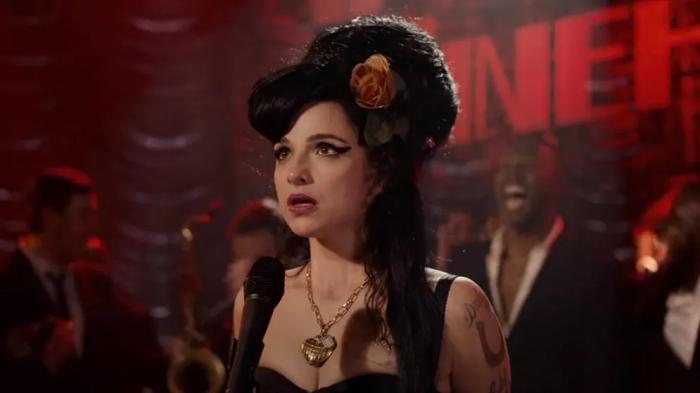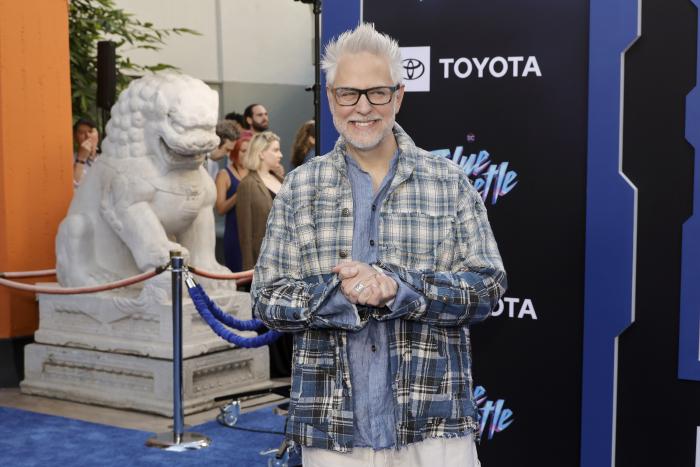

Review: Look, You Knew ‘Back to Black’ Was Bad, BUT STILL!
By Kayleigh Donaldson | Film | April 18, 2024 |
By Kayleigh Donaldson | Film | April 18, 2024 |

When Amy Winehouse died at the age of 27, the world had to contend with how it treated her. The jazz singer with the gravity-defying beehive had been a press punching bag for years thanks to her addiction issues, mental health struggles, and penchant for public embarrassment. Plenty of people laughed at her during her lows and then mourned her passing without confronting the machine they fed into with their derision. Since her passing, Brand Amy has only grown, with a posthumous album, museum exhibits, tacky Club 27 tribute acts, and even a cancelled hologram tour. These so-called celebrations of Winehouse’s life and talents have felt more like transparent cash grabs than anything else, and into this fray enters Back to Black, the official Winehouse biopic by director Sam Taylor-Johnson. Her family and estate seem to be delighted with the results. Those of us who actually care about Amy’s legacy will think differently.
Look, we knew this wasn’t going to be good. You all saw the trailers. We know how the musician biopic subgenre works and how utterly unconcerned it is with truth when record sales are on the line. All the stuff that sucks about Back to Black is the stuff that sucks in all biopics: it’s cowardly in taking on well-documented truth, it’s clearly doing a nice PR clean-up for the living subjects, and it does a shoddy job of conveying the magnetism of a once-in-a-generation talent. Don’t come to Back to Black for understanding. You don’t sell vinyls with that kind of attitude.
Marisa Abela, best known for the HBO series Industry, plays Amy. A lifelong jazz fan from a Jewish family, she hopes to use her confrontational lyrics and smoky voice to make her grandmother Cynthia (Lesley Manville) proud. She begins to climb the career ladder with an acclaimed first album, Frank, but a growing dependency on alcohol hinders her ambitions. When she meets Blake Fielder-Civil (Jack O’Connell), a layabout charmer with a taste for coke, her head-over-heels love affair inspires the album that makes her a star. But her troubles only get worse, and now the whole world is watching.
Amy’s father, Mitch Winehouse, notoriously hated the Asif Kapadia documentary about her life because he felt it painted him in too negatively a light. He had an issue with the filmmakers (and much of Amy’s friends and associates) viewing him as a narcissist who liked his daughter’s fame more than her wellbeing. Back to Black is certainly keen to tip the scales in the other direction, because now, as played by a two-dimensional Eddie Marsan, he’s father of the year. He scolds Amy for smoking pot and lets her know that drugs are bad. He accompanies her to record label meetings to keep her in line and give advice about her career that all the executives love. He tells her to go to rehab. Just kidding, no he doesn’t. We have a whole song letting the world know about that, but the film does portray that moment as one of a loving daddy who just wants what’s right for his girl (and to ensure she doesn’t get dropped by her label.) One must commend Taylor-Johnson, I suppose, for restraining herself enough to not place a literal halo over Saint Mitch’s head in every scene.
What was less expected was the near-saintly portrayal of Blake Fielder-Civil, Amy’s husband and the man who, by his own admission, introduced her to hard drugs. Jack O’Connell, a perennially underrated star of the Skins generation, nails the sleazy 2000s indie boy charm of a hanger-on who can still charm a megastar into his arms (although he’s also perhaps the only crack addict with the physique of a bootcamp bro.) One wonders if the director and writer feared painting My Blake Incarcerated as the sole force of evil in Amy’s life, which is, let’s be honest, what we all expected. But the course correction has him as such a passive force in Amy’s life that it renders Winehouse herself a caricature of herself. He doesn’t get her into drugs in this film because, instead, she goes from booze to crack in one scene after a tiff with him. The implications of the ending, and how it suggests the motivations behind Amy’s eventual death from alcohol poisoning, made my gut twist too.
Also, we’re supposed to believe that Amy, a lifelong music nerd, had no idea who the Shangri-las were until Blake introduced her to them, this inspiring her entire Back to Black aesthetic? PLEASE.
Their relationship’s dark points aren’t truly explored either. Back to Black is honest enough to admit that Amy often hit and scratched Blake during their ferocious fights, but we don’t see much of this. Her disordered eating is shown but not delved into, and Blake mentioning her self-harming comes out of nowhere. Taylor-Johnson is clearly keen to avoid trite biopic tropes with her more impressionistic take on her tumultuous life, but that only leads to the film swinging back into cliches. It leaves huge gaps, which is all the more baffling given how tragically short Amy’s life was. We get no real understanding of just how famous she got in a brief period of time, nor of why she became a tabloid magnet.
This insular quality could work if they weren’t so timid in actually confronting the realities of a woman who was an alcoholic drug addict with severe mental health issues. I’m not asking them to show Amy in the gutter like so many trite biopics before Back to Black, but by stripping away the prickly truths, all we’re left with is a sketch of a life that does not justice to its subject. Taylor-Johnson’s attempt to compensate mostly relies on hackneyed imagery, particularly of a caged songbird (GET IT?!)
It’s made all the more aggravating by Marisa Abela clearly putting her heart and soul into portraying Amy as a funny, warm, and music-loving London girl, showing the side to her that the press overlooked. This is an actress who deserves proper material to work with, not a shy publicity campaign for some Spotify streams. She does her own singing and is perfectly capable, but it’s not Amy’s voice. Winehouse wasn’t just a brilliant singer: she was a master interpreter of jazz classics and her own songs. Abela’s tribute feels like just that: a tribute singer in a bar who is decent enough for you to sing along to but nothing else. The lack of time given to Amy’s creative process is also baffling (where is Mark Ronson, and why are the Back to Black sessions just skimmed over so flagrantly?!)
Addiction is a tough thing to portray. Many have tried and either made it seem too glamorous or leered voyeuristically at the degradation of it all. I get Back to Black’s desire to avoid that, but in the end, what do we have here? We get a very basic story about a basic woman who could sing well and obsessed over a man who chastised her for not behaving properly. We get a brilliant, complicated, messy, devastating woman reduced to not much at all, which might be more insulting than if they’d turned her into a near-mute poster image akin to the recent Bob Marley biopic. If you want Amy Winehouse’s real story, turn to her music, which was confessional and achingly crafted by someone who had impeccable power over her work. Either way, Saint Mitch gets his money.
Back to Black is now playing in UK cinemas, and will premiere in US theatres on May 17.
← Josh Hartnett Is a Dad Trapped in a Pop Concert in the Trailer for M. Night Shyamalan's 'Trap' | Nick Offerman Once Spent The Night High In Jail After Being Mistaken For A Robber →
More Like This
Review: ‘Under the Bridge’ Is a Must-Watch True Crime Series That Gives the Victim a Voice
Review: ‘Sting’ is a Charming Creature Feature and What I Wanted from ‘Evil Dead Rise’
Review: Alex Garland's 'Civil War' Is A Scary Minefield of Apolitical Provocations
Finally, Our First Great Studio Horror Film of the Year
There is No Way ‘Sugar’ Will Survive a Week-to-Week Rollout

James Gunn Has Found His Ma And Pa Kent
Jimmy Kimmel to Trump: 'Keep My Wife's Name Out of Your @$#ing Mouth'
Quentin Tarantino Just Scrapped ‘The Movie Critic’
Leave Sydney Sweeney Alone! Producer Says She's 'Not Pretty,' 'Can't Act'
Rebecca Minkoff Joins RHONY and More Hirings and Firings In the Bravoverse
Bravo’s One Season Wonder ‘NYC Prep’ Is Back and Creepier Than Ever
More Like This
Review: ‘Under the Bridge’ Is a Must-Watch True Crime Series That Gives the Victim a Voice
Review: ‘Sting’ is a Charming Creature Feature and What I Wanted from ‘Evil Dead Rise’
Review: Alex Garland's 'Civil War' Is A Scary Minefield of Apolitical Provocations
Finally, Our First Great Studio Horror Film of the Year
There is No Way ‘Sugar’ Will Survive a Week-to-Week Rollout
Reviews